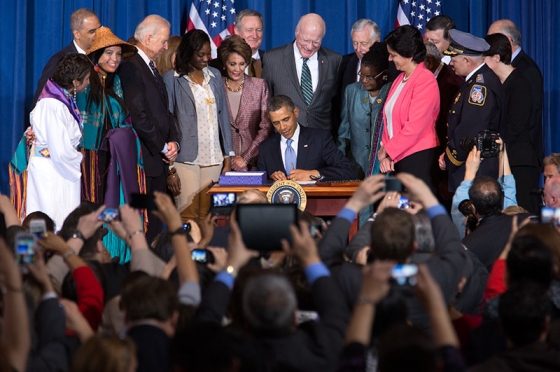
Tribes prepare to implement new laws in Violence Against Women Act

President Barack Obama signs S. 47, the “Violence Against Women Reauthorization Act of 2013,” (VAWA), which reauthorizes several Violence Against Women Act grant programs through FY 2018; and the Trafficking Victims Protection Act of 2000 through FY 2017, in the Sidney R. Yates Auditorium at the U.S. Department of Interior in Washington, D.C., March 7, 2013. (Official White House Photo by Chuck Kennedy)
WASHINGTON

President Barack Obama signs S. 47, the “Violence Against Women Reauthorization Act of 2013,” (VAWA), which reauthorizes several Violence Against Women Act grant programs through FY 2018; and the Trafficking Victims Protection Act of 2000 through FY 2017, in the Sidney R. Yates Auditorium at the U.S. Department of Interior in Washington, D.C., March 7, 2013. (Official White House Photo by Chuck Kennedy)
Tribes across the country are preparing to implement historic provisions allowing them to prosecute non-Natives accused of specific crimes on tribal lands.
The reauthorization of the Violence Against Women Act, passed by Congress in 2013, includes provisions that give tribes unprecedented authority to hold non-Natives accountable for crimes against women.
In March, all tribes that meet standards for training and resources will be able to arrest, charge, prosecute, convict and sentence non-Natives accused of sexual assault or domestic violence against Native women.
It’s a milestone for which Vice President Joe Biden has waited decades. Twenty-four years ago, Biden, then a senator from Delaware, introduced the Violence Against Women Act, a landmark legislation that changed the way America responded to domestic violence and sexual assault. The first version of the act was passed in 1994.
The act modified law enforcement policies, improved the criminal justice system and established a network of support services. But it took more than two decades to extend some of those same protections to Native women.
“I apologize for taking so long,” Biden told an audience of tribal leaders Dec. 3 at the sixth annual White House Tribal Nations Conference. “So many women were damaged in the meantime.”








 Highway 264,
Highway 264, I-40, WB @ Winslow
I-40, WB @ Winslow